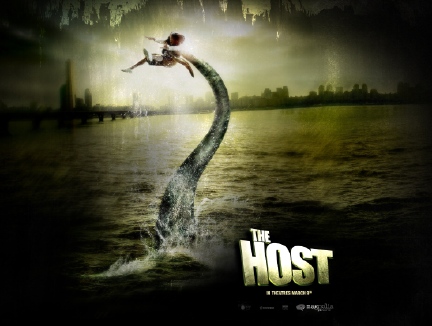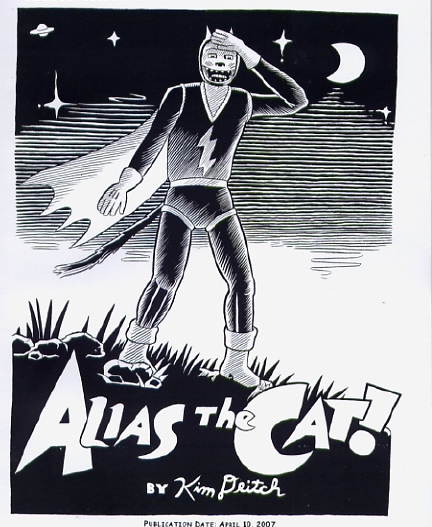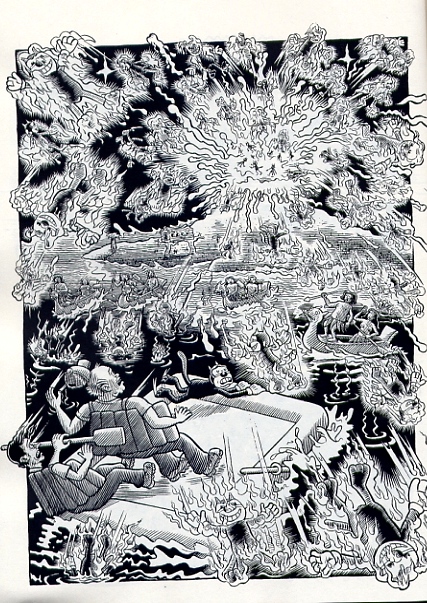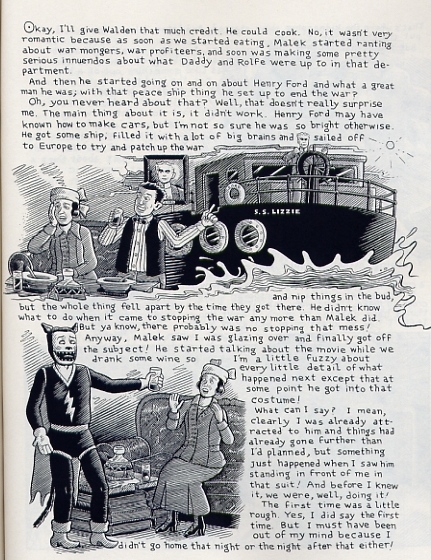|
|
|
|
This Just In...News
From The Agony Column
|
| |
|
03-09-07 Update # 2: A Review of The
Host for NPR's Weekend
All Things Considered
|
Reverse Engineering
Here is a link
to the NPR page that will contain the audio for my review of The Host.
|
|
| All
monster in broad daylight. At the BEGINNING of the movie. |
 Weekend
All Things Considered is going to air my review of the OUTSTANDING
Korean monster movie, The Host, directed
by Bong Joon-ho, that reverses the usual
formula and achieves a remarkable success. You can
catch Weekend All Things Considered between 5PM and
6 PM on your local NPR affiliate, assuming that a news event does not
dictate an override. In general, arts reports run towards the end of
the show, but I don’t
have a time as of yet. When I can get audio, I'll post a high-quality
MP3
file,
but
to be honest,
I was out seeing the movie on the big screen today. I enjoyed the
hell out of it. If you love monster movies, then you'll want to see
this one,
as it's destined to become a classic in the genre. Weekend
All Things Considered is going to air my review of the OUTSTANDING
Korean monster movie, The Host, directed
by Bong Joon-ho, that reverses the usual
formula and achieves a remarkable success. You can
catch Weekend All Things Considered between 5PM and
6 PM on your local NPR affiliate, assuming that a news event does not
dictate an override. In general, arts reports run towards the end of
the show, but I don’t
have a time as of yet. When I can get audio, I'll post a high-quality
MP3
file,
but
to be honest,
I was out seeing the movie on the big screen today. I enjoyed the
hell out of it. If you love monster movies, then you'll want to see
this one,
as it's destined to become a classic in the genre.
As I get more information, I'll update this URL with the usual pointer
to the Email this Story link, and the usual request to email as early and
often as you can. Check back regularly, and keep an eye on your RSS feed.
And thanks again to all those out there who helped me get this together
-- that help was INVALUABLE and APPRECIATED.
|
| |
| |
|
03-09-07: Delicacies and Collections from Presses
Small and Large ; Everybody's Joiking
|
Bruce Sterling, Peter S. Beagle and Henry Kuttner
Reading isn’t all about what’s new, which is why
I'm more interested in books than movies. There are very few
movies I can make myself watch
once, let alone more than once. Books on the other hand can easily
be read and re-read. Three prominent re-print-thingies point
this out to us with
crystal clarity.
|

|
"..but
none do there, I think, embrace.."
|
I believe that
it was Peter S. Beagle whom I first encountered amongst these three
authors, when back in the day, I picked up the Bantam Adult
Fantasy mass-market paperback of 'The Last Unicorn' and 'A Fine and
Private Place'. Funny how a simple imprint series can shape, to my
mind, a generation
of readers and writers. That bookrack at the Lucky store in West
Covina, California was probably every bit as important a source
for me as Change
of Hobbit was back in those tender years. Maybe more so, as it was
local. But those copies are too precious to read now, and so I'm
glad to see that
Tachyon is bringing out a nice, shiny new version of 'A Fine and
Private Place' (Tachyon ; June 2007 ; $14.95), a sweet, sad and
smart novel
about life, death and love. Beagle's classic begins with Jonathan
Rebeck taking
delivery of "a whole baloney" from a talking raven at his
place of residence in the Bronx's Yorkchester Cemetery. He's there
to talk to
the newly dead, offer them comfort or an opponent should they feel
inclined to play a little chess. Of course, the impossible happens:
two ghosts fall
in love and Rebeck finds himself drawn to a living woman. All that
wisdom for the dead leaves little to spare for the living.
What distinguishes this novel, aside from like being first on the block
with the speaking to the dead deal, is Beagle's gorgeous prose. I remember
being struck by it when I read it, because what I liked about 'The Last
Unicorn' was its prosaic approach to fantasy. Here, Beagle pulls out all
the lyrical stops and you can practically hear the soundtrack. If you've
only got your ratty Bantam paperback version, then put it in a Ziploc bag,
and shell out the bucks for this update, which contains the author's final
revisions. (No sacrilege.) It's a classy cover and a nice keepable, readable
and loanable edition of a book that has endured for a reason. It can be
read and -re-read.
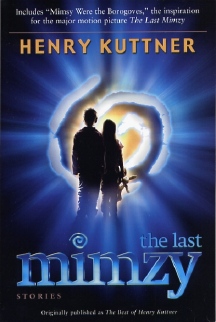 |
|
| Come
on. How can you misspell a word from Jabberwocky? |
While one might
tend to be ill-disposed towards those who take our favorite classics
and shred them onscreen, one cannot dispute the
decent cover of
'The Last Mimzy' (Ballantine / Random House ; March 6, 2007 ; $13.95),
nor the fact that it is simply a re-print of 'The Best of Henry
Kuttner'.
This is by definition, a good thing, especially if it gets Kuttner's
work in front of modern eyes. Kuttner often wrote under pseudonyms
and collaborated
with his wife, C. L. Moore; together they shaped much of my initial
positive impression of science fiction. Every "Best Science Fiction Stories,
Ever"-style anthology I ever read had at least on story by one, the
other, or both. 'The Last Mimzy' includes 'Mimsy were the Borogoves', 'The
Twonky', 'The Voice of the Lobster' (calling Charlie Stross, please report
to the white courtesy desk) and 'The Big Night', along with a host of others.
Other than the cover and title, it looks like a straight-up reprint of
the original version published an alarming 32 years ago. It includes an
introduction by Ray Bradbury and type that looks more than 30 years old.
It's not optimal but it's probably the best and easiest version of this
writer's work you can get. Heck it should have some kids on its knee and
start thinking about that 401K by now. Yes, we do want to slap whoever
decided to change not only the title but the spelling of "mimsy" which
displays a cluelessness so deep one fears it could suck in the entire
solar system. But I'll not carp about any re-print that puts this
fine author's
work out there. He manages to be timeless in a manner that eludes
most science fiction writers.
And finally, the
obvious must-buy is 'Ascendancies' by Bruce
Sterling (Subterranean
Press ; August 27, 2007 ; $38) and holy moly I can't believe that
fantastic damn price. Sorry, sometimes the fingers just type and I
can't stop 'em.
But really. The Best of Bruce Sterling from Sub Press in one of their
gorgeous hardcovers for $38? Well, it's the sort of thing that really
turns your
head. Now, I did encounter Sterling later in my reading life, after
I picked up 'Mirrorshades', the seminal cyberpunk anthology. But after
that it was
down the rabbit hole, an analogy most apt for Sterling's work, which
can run the gamut not just of science fiction, or fantasy, or genre
fiction,
or even literary fiction -- but like, writing. I was immersed in
the primitive version of the Internet that existed when Sterling's
'The Hacker Crackdown'
came out, working for a stock market quote vendor that owned lots
of the lines through which the Internet moved. That book, and others,
like 'Schismatrix'
and 'Globalhead' was a revelation to me. And talk about re-readable!
My copy of 'Globalhead' now stands a much better chance of surviving,
since
this book includes 'The Compassionate, the Digital', Sterling's prescient
story about the awakening of an Islamic AI. It's not science fiction,
though. To my mind this is very pure horror story.
|
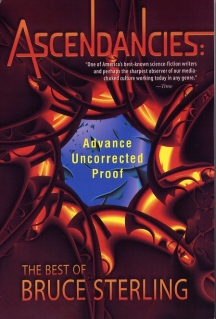
|
Weird
literature for smart people.
|
'Ascendancies' includes
a forward by Karen Joy Fowler, and one by Bruce Sterling. The stories
that follow are organized into five major
divisions.
Part I is "The Shaper / Mechanist Stories" that add to the work
in 'Schismatrix'. Part II is "Early Science Fiction and Fantasy",
and includes some of the stuff that showed up in his Arkham House collection
as well as the Zeising collection and other places. Part III offers up
three '"Leggy Starlitz Stories'", Part IV "The Chattanooga
Stories" and Part V "Later Science Fiction and Fantasy".
The collection is over 500 pages of fantastic fiction. Now we need
only wait for the accompanying and equivalent volume of non-fiction.
Sterling is both a brilliant mind and an important writer because
he wears so many hats with such ease. The futurist-humorist who writes
the Leggy
Starlitz stories. I'm a sucker for those stories. I just adore them,
they're very funny and clean and super-smart. His visionary science
fiction stories,
the Shaper-Mechanist works that include 'Schismatrix', still effectively
wiggle my brain. His utterly weird recent fantasies, like 'The Blemmye's
Stratagem' are timeless and peerlessly weird literature. Sterling
can
do anything and pretty much has done everything. It's not all here
in this
collection, but this handy hardcover will remind you why science
fiction is so eminently re-readable in a most interesting manner.
Actually,
Sterling has not a little in common with Kuttner in his what I would
call generalist
tendencies. 'Ascendancies: The Best of Bruce Sterling' will itself
ultimately be reprinted for future generations; let's just hope that
some enterprising
Hollowood type doesn't decide to make a movie about Ziggy Starlitz.
In the interim, here's the book you can buy so that your grandchildren
can
discover it on your bookshelves ("Why do you have those print things?").
They shall be changed by their forbidden reading. And having read a story
once, they’re well on their way to re-reading. Science fiction
may be about what is new and now. But reading science fiction is
just about
reading great writing. These books all qualify.
|
Preview for Podcast of Monday, March 12, 2007
Here's
an MP3
preview of the Monday March 12, 2007 podcast for The Agony Column.
Enjoy!
|
| |
| |
|
03-08-07: Kim Deitch Tracks Down 'Alias The
Cat'
|
Bent Minds Think Alike
|
|
| Kim
Deitch steps out of his shell. Sort of. |
I did my time with underground comix back in their heyday; The Fabulous
Furry Freak Brothers, The Leather Nun, Raw and
others I'm sure I cannot recall. But its only recently and tentatively
that I've been
drawn back
to the world of graphic novels / comix – whatever you want
to call them. One big reason is that Pantheon Books, in association
with Fantagraphics,
has been publishing incredibly well-designed and produced hardcover
versions of comics that have come out in serial form. Take for example
'Black
Hole', Charles Burns' incredible horror epic, which was one of the
best horror novels of 2005. The rich, deep blacks, the heavy-duty
paper, they
all went to create an immersive experience that rivaled a pure print
novel for this reader who loves pure print novels and generally feels
that they have no rival.
I'm super-pleased to offer readers an advance glimpse of the new
novel by Kim Deitch, 'Alias the Cat' (Pantheon Books
/ Random House ; April 10,
2007 ; $23), which collects three publications – 'The Stuff of
Dreams', 'The Stuff of Dreams #2' and 'The Stuff of Dreams #3' -- in
one glorious
hardcover to tell the true, complete story of, well, Alias the Cat.
And what happens when obsessed collectors attack. And much, much more.
What Deitch does in 'Alias the Cat' is to follow a dream-like chain of
events that begins with his and his wife's interest in weekend flea markets,
but leads through a series logical steps far astray, into realms of dream-like
logic and surreal experience. Deitch's wife is a collector of stuffed black
cat toys from the 1930's. Sure, it sounds kitschy and harmless. Fun. But
each episode in this comic finds her picking up a piece of memorabilia
that has some story behind it, and that story has a story behind it, and
soon the stories veer off into realms of fantasy, or if not fantasy, experience
so strange it really seems like a fantasy.
|
|
| Mind
blowing segments will keep you off your feet. |
The logic that each of the segments follows and the story as a whole is
reminiscent of the narrative logic one encounters in a David Lynch movie,
where the steps seem reasonable if a bit sideways until we realize that
we are in an entirely different story than the one that started the work.
Deitch's art is filled with inky-dark blacks but doesn't seem dark. We
see moments of domestic normality that slowly veer into increasingly bizarre
territory, which eventually culminate in some great moments psychedelic
surrealism.
While much of the work is done in comic-panel style, there are portions
that include lettered prose text interspersed with illustrations, giving
the work a more novelistic effect. I know that this just assuages my inclinations
to prefer novels over comics, but there you have it and it works just fine
for the effect that the writer is trying to achieve, a sort of patchwork
reality woven out of bits of actuality and other, well, non-actual bits.
'Alias the Cat' is a layered, textured work.
Also notable for this reader is Deitch's masterful use of the transreal,
as Rudy Rucker calls it. By putting himself and his wife into stories
that involve increasingly fantastic events, Deitch draws the reader
in towards
those events and brings those events into the reader's life. And while
it's probably not meant to do so, the inclusion of "The Mail Bag" at
the head of each issue / chapter enforces that notion by including
what at least appears to be actual reader mail in the work. On one
hand, I believe
that I'm imposing my own critical view on this material, but on the
other hand, Deitch does not just leave the door open, he props it open
with the
addenda of the real world. Of course this firm connection to the real
world makes the journey in the otherworld seem if not more real, well,
at least
more substantial.
|
|
| Illustrated
text will also keep you off your feet. |
At 136 pages, 'Alias the Cat' is a pretty quick read, but really immersive
and strange, the sort of book that you can re-read and re-experience.
I know that I miss these things when they come out in serial form,
but to
a certain extent, I'm glad I do. Seeing the whole story collected in
one place, and having the opportunity to experience the entirety of
the work
fresh just seems optimal. And besides, the magnificent printing quality
gives this book some serious object lust-worthiness. If you like cats,
collecting, the bizarre, discovering nooks and crannies of history
that may or may not exist, if you want the world to surprise you, – look
here. At least, do so before you decide to start collecting stuffed
black cats.
|
| |
| |
|
03-07-07: David Corbett's 'Blood of Paradise'
|
From Sophocles to El Salvador
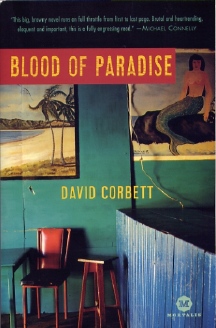 |
|
| Even
the furniture hasn't improved in 2416 years. |
Our predicament is not simply familiar.
It is ancient.
David Corbett can tell you just how ancient; 2,416 years.
His new novel, 'Blood of Paradise' (Mortalis / Ballantine / Random House
; March 13, 2007 ; $9.95) is set in El Salvador, in the present, but the
events he describes are in part based on his reading of Sophocles play
Philoctetes, first performed in 409 BC. So straight out of the gate, it's
not as if we foresee any major changes in human behavior on the horizon.
But when we hold up El Salvador as a foreign policy success to be emulated
in Iraq, perhaps we'd be well-advised to actually examine what we're saying.
Corbett's new novel is an impassioned, complicated literary exhumation
of a past and a present that are leading to a less-than-desirable future.
In Sophocles' play, Neoptolemus is an ambitious young warrior sent
to retrieve an invaluable weapon. He's coerced into using less-than-savory
methods
to do so. Deception and trickery make his mission a success that
brings down a curse upon an about-to-succeed army. It turns out that
pragmatic
plans made with the best of intentions yet executed with dodgy methods
don't play out as one might wish. Execution matters as much as intention.
Moreover. the best intentioned young men are compelled to prove themselves
to their elders, even when those elders do not have any good intentions
whatsoever. Yet here we are, nearly 2500 years later, and still we
haven’t
learned these lessons. Don't hold your breath.
Corbett's new novel follows Jude McManus, a bodyguard ("protection
specialist"), assigned to an engineer working for big American
money in El Salvador. McManus has a complicated past. His father,
a cop, was
arrested with two other cops for robbing street dealers; the other
two cops got off and Dad died under questionable circumstances. One
of the
men pops up in El Salvador, looking for a favor. CF the para above
for a rundown of Jude's decision. Best of intentions, questionable
methods?
Got to impress the Old Men, even they might just be total shitheels.
But nothing is simple with Corbett and nothing is straightforward.
He's a master at immersing you in a sea of contradictions while describing
real
life so that it’s not only interesting to read about, but
manages to sound like real life. There's a woman in the frame here,
and more men,
bad men, good men ... Men with lots of guns and violent inclinations.
Written from a multiplicity of perspectives, Corbett offers what
readers desire
most, intense tension and gritty authenticity. As a writer, Corbett
is true to his vision. He does not in fact compromise his methods
to achieve
his aims. The result is a book that is dense with detail and character,
rich with plots and subplots, filled with the absurdity of Americans
puttering about in foreign territories where they have no business
being. Yet it
is ultimately business that brings them to the point of self-destruction.
Corbett should be on your auto-buy list, and has been much missed
in the time since he brought readers 'The
Devil's Redhead' and 'Done
for a Dime'.
He continues his canny combination of politics, mystery and evocative,
in-your-face atmosphere with 'Blood of Paradise'. While I have in
the past been a hardcover-only sort of fellow, and feel that this
novel certainly
deserves a hardcover publication, I have to say that this whole Mortalis imprint assemblage is pretty sweet. Following the novel, you're going
to find 15 pages of exegesis by the author, written with the same
passion
he brings to his fiction. Corbett might just ruffle your political
feathers depending on your beliefs. While I'd prefer bigger type,
the font is surely
readable and the price is outstanding -- just $9.95 for a meaty trade
paperback by one of the genre's premiere authors. This is an exceptionally
strong
opening gambit for Mortalis, and suggests that they actually read
the book and have managed to take heed of the lessons. Could it be
that men might
learn something after nearly twenty-five hundred years? I wouldn’t
hold my breath. Nobody's said that the publishers and editors behind
the imprint are men. Men might never learn, but women -- they learn
all right,
from our mistakes. Which only compounds those mistakes.
|
| |
| |
|
03-06-07: Jonathan Lethem Suspects 'You Don't
Love Me Yet'
|
The Force of Farce
|
|
| Complaints?
I got some complaints. You don't have enough time to hear
my complaints. So, how much time do you have? I can at least
start. |
Write a huge and clearly important novel like 'The Fortress of Solitude'
at your peril. A multiplicity of perils, in fact.
Compared to the outstandingly clear, utterly transparent science fiction
farce of 'She
Crawled Across the Table', 'The
Fortress of Solitude' lives
up to its name. It's a magnificent demonstration of Lethem's chameleonic
strength as a writer that he can write what seems to be a little ditty
about pocket universes, and an intense and dense and personal novel about
kids growing up in Brooklyn. But a huge, dense, sprawling novel imperils
the audience for the clear farces and also acts as a sort of misdirection.
Obviously, 'The Fortress of Solitude' is stuffed with the complexity of
life. It has a lot to say and it says it well. One might be tempted to
think then, that when Lethem writes in a lighter mode that he's not packing
in just as much intense thought into the novel. As if a novel about pocket
universes might have less to say than a novel about growing up in Brooklyn.
One man is behind both books, folks. One mind is behind both books, and
behind the latest novel as well, 'You Don’t Love Me Yet' (Doubleday
/ Random House ; March 13, 2007 ; $24.95). Me, I'm thankful that Lethem
enjoys life enough to write books that are funny, and make no mistake about
it, 'You Don’t Love Me Yet' is funny. Of course, your ability to
laugh is probably inversely proportional to how close you are to the LA
alternative rock scene. I imagine there are some folks down south who are
cringing instead of laughing. I'm up in Northern California, so my cringe
factor is reduced, but I have to say not entirely absent.
Anyone who has been in or even around a band will instantly recognize the
dynamics that Lethem unfolds here. Lucinda Hoekke is the bass player and
Matthew is the handsome, "malnourished vegetarian" lead singer
who is sort-of her ex. Denise is the drummer, a sensible sort who works
in a masturbation emporium while pining for Bedwin, the band's songwriter
who is, er, sort of, not writing at the moment. This problem gets solved
by virtue of Lucinda's job, which puts her in touch with The Complainer.
Sample. Cut and paste. Plagiarize. It's all art, innit?
Well, yes and no. In fact, though the novel is very short and the scenario
seems pretty simple, the thought process behind the novel is remarkably
complex. 'You Don't Love Me Yet' gives readers fully-formed, entertaining
characters who happen to be playing out the analogue of one of today's
greatest dilemmas -- bit copying. Is it art? Even before Warhol poured
us a pitcher of the Campbell's can, we were getting into this territory.
But today's technology makes copying and editing absurdly easy. How much
change is enough change to turn a copied piece into your own? How much
of you has to go into your art? What part does the personality play into
getting your art out there?
Lethem's witty novel ponders these problems and more. When does inspiration
become copying? And when does copying become stealing? Prose is the easy
to steal, as the plethora of plagiarism cases now popping up in the literary
world and elsewhere attest. What happens when readers start mixing and
matching texts? I mean, you toss Shakespeare, Huxley, Roth and Bradbury
into the blender, you're going to come up with something interesting. Heretofore,
it's been done by the rather slow and cumbersome processes of reading,
thinking, and then writing. Now you can do it electronically and as to
which is the more authentic, the more important work of art? Well that's
a decision that gets postponed by definition until long after we die.
But in the interim, it makes for some fascinating thought experiments.
It's Jonathan Lethem's talent to be able to conduct those thought experiments
in the midst of a light-hearted romantic farce. Readers need not think
deep thoughts when reading 'You Don’t Love Me Yet'. But the chances
are they will -- with smiles on their faces.
|
| |
| |
|
03-05-07: A 2007 Interview with China Miéville and a Review of 'Un Lun Dun'
|
Beneath the Abcity
|

|
He's
just a happy sort of guy. With monsters.
|
China Miéville and I have one thing in common.
We LOVE monsters.
Do you love monsters? Then you can count on finding quite a few of them,
lovable and not-so, in
'Un Lun Dun', reviewed in depth, and in final form from the US publisher
here. It's an astonishing debut in this genre,
with many of the same elements one finds in his adult fiction, particularly
that combination of the organic and the manufactured that we saw in the
horrific ReMade. Funny how the same elements can be recombined into something
that's friendlier to younger readers but loses little of its punch. Miéville
and I talked extensively in our interview about his new novel.
We also talked about 'Looking for Jake', his collection of short stories.
Struck by the graphic story 'On the Way to the Front', I asked Miéville
flat out if he'd consider writing for Batman, and about his next novel,
which he informed me will be set in the current day ... with monsters.
For those who entered last week's giveaway, the books are in the mail
today -- three signed, first edition copies of Guy Gavriel Kay's excellent
'Ysabel'. This week, I'm proud to have three signed, first edition hardcover
copies of 'Un Lun Dun' to give away. Email me to enter the contest, I'll
do the drawing next weekend.
I'm pretty sure most of my readers will be eager to hear what this writer
has to say. As ever: MP3, or RealAudio.
When you talk to lots of writers, you start to notice some cross-currents,
and I couldn’t help but
think of David Lynch, diving into his unconscious for that image that
will turn into a story when Miéville talked of rooting about in
his grotesque imagination and bringing up whatever he could, whatever
monsters spoke to him and asked to become part of a story. Miéville
was quite insistent that he's interested in telling a great and grotesque
story first and should there be other themes or observations to emerge,
he was happy about that, but his bailiwick was the ocean of critters
that delighted him as a ten-year old boy and does so to this day. An
ocean of monsters? Sounds good to me.
I LOVE monsters.
|
| |
|
|
Weekend All Things Considered is going to air my review of the OUTSTANDING Korean monster movie, The Host, directed by Bong Joon-ho, that reverses the usual formula and achieves a remarkable success. You can catch Weekend All Things Considered between 5PM and 6 PM on your local NPR affiliate, assuming that a news event does not dictate an override. In general, arts reports run towards the end of the show, but I don’t have a time as of yet. When I can get audio, I'll post a high-quality MP3 file, but to be honest, I was out seeing the movie on the big screen today. I enjoyed the hell out of it. If you love monster movies, then you'll want to see this one, as it's destined to become a classic in the genre.


